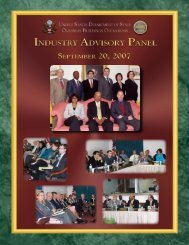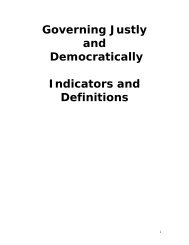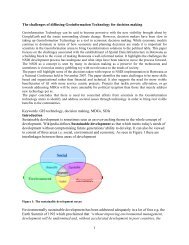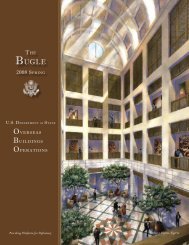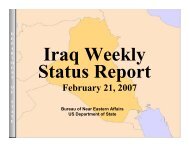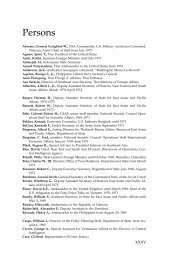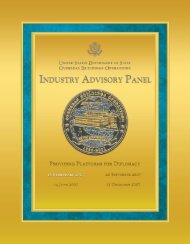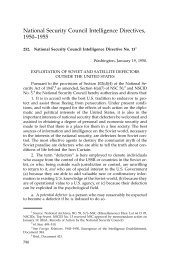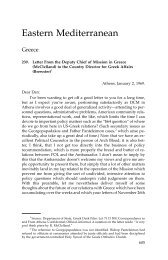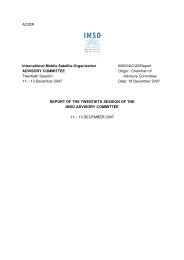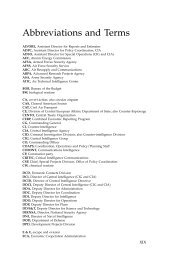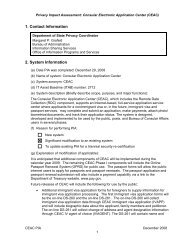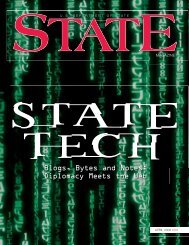MEMORANDUM FOR DR. KISS INGER r r FROM: Robert M. Behr 1 ...
MEMORANDUM FOR DR. KISS INGER r r FROM: Robert M. Behr 1 ...
MEMORANDUM FOR DR. KISS INGER r r FROM: Robert M. Behr 1 ...
Create successful ePaper yourself
Turn your PDF publications into a flip-book with our unique Google optimized e-Paper software.
THE WHITE HO-C.1Si<br />
WASHINGTON<br />
<strong>MEMORANDUM</strong> <strong>FOR</strong> <strong>DR</strong>. <strong>KISS</strong> <strong>INGER</strong><br />
r r<br />
<strong>FROM</strong>: <strong>Robert</strong> M. <strong>Behr</strong> 1„,,"i'?<br />
Harold H. Saunders "<br />
SUBJECT: Paper on Possible Alternative Pressures on the Present<br />
Libyan Regime—Summary and Critique<br />
The question the President asked was whether there is any way we<br />
could create penalties that might deter the Libyan government from<br />
its leftward course.<br />
The paper covers this ground:<br />
1. It characterizes (page 1) the new Libyan government as<br />
insecure, inexperienced, zenophobic, perhaps divided but as<br />
yet without visible opposition.<br />
2. It details US economic interests (page 1 and Annex A) in<br />
terms of the $5 billion (replacement value) private oil investment,<br />
$500 million in annual profits to US corporations and 25% of<br />
Western Europe's oil consumption which could not all be replaced<br />
from other sources until 1971. It concludes that Western Europe<br />
is too dependent on Libyan crude to refuse to buy. Only 8% of<br />
Libyan production corm s to the US.<br />
3. It describes (bottom of p. 2) our choice in developing a<br />
strategy toward the new Libyan government as between:<br />
a. "policy of confrontation" and<br />
b. "a policy which would involve some give on our part with<br />
a view to developing longer-term relationships with the new<br />
and still insecure regime."[State prefers this.<br />
4. It examines—and this is the bulk of the paper (pp. 3 - 9 ) - - a<br />
collection of possible alternative pressures. [The paper concludes<br />
that most are unsatisfactory because the leverage is not predominantly<br />
on the US side. ]<br />
DECLASSIFIED<br />
PA/HO Department of State<br />
E.O. 12958, as amended<br />
September 6, 2007
Summary of the Alternatives: We recommend that you scan pages 3-9<br />
but for the sake of simplifying , these options fall into the following<br />
categories:<br />
1. Presence of US-UK bases. These options boil down to a<br />
series of delaying tactics and, hopefully, some NATO European<br />
(Turkey, West Germany) pressures on Libya to honor its base<br />
agreements. They culminate with the US requesting the support<br />
of European friends in breaking diplomatic relations with Libya<br />
if the regime refuses.<br />
a. The argument for this approach is to see whether such<br />
pressures would widen splits within the regime.<br />
b. The arguments against are that the regime in its present<br />
mood is unlikely to respond to this kind of pressure- - especially<br />
NATO pressure--and that it is doubtful that West Germany and<br />
others would risk their economic interests to support us.<br />
2. Economic pressures range through requesting US companies<br />
to curtail their offtake, advising US technicians to leave, cutting<br />
off US oil imports from Libya, restricting additional US investment,<br />
and freezing Libyan reserves in the US. There are specific arguments<br />
on each one of these in the paper (pp. 4-6) but in general they<br />
boil down to these:<br />
a. The argument for is that oil income is the Libyan government's<br />
main source of income. Any move that effectively<br />
cut into this would cause Libyan concern, although Libya now<br />
has more income than it can use so it has some cushion.<br />
b. The argument against is essentially that US companies<br />
would suffer more than the Libyan government. European<br />
companies are ready to replace American in marketing<br />
Libyan oil. The Libyan government could cause some disruption<br />
in foreign exchange markets *by shifting its reserves<br />
suddenly.<br />
3. Military actions range through a Sixth Fleet show of force<br />
off the Libyan coast and movement of troops (hopefully in concert<br />
with the UK) to hold training areas<br />
DECLASSIFIED<br />
PA/HO Department of State<br />
E.O. 12958, as amended<br />
September 6, 2007
_<br />
4.<br />
Comment:<br />
a. The argument for would be to make the re gime uncertain<br />
about our intentions toward it<br />
b. The argument against is that we would have to prepare for<br />
longer term occupation if we intended a show of force beyond<br />
mere evacuation of Americans. This would provoke a sharp<br />
reaction in the Arab world and, within Libya, would not<br />
protect the farflung installations of US oil companies.<br />
a.<br />
b.<br />
1. It seems to us that the base-related am political<br />
pressures would probably not work, and the leverage is on the<br />
wrong side br the economic pressures.<br />
2. A landing of forces at Wheelus seems an option worth<br />
1 considering, but the longer they stayed the less able they would<br />
be to maintain the cover of evacuating Americans and the more<br />
vulnerable private oil installations would become.<br />
3. We suggest an NSC briefing covering these points:<br />
\i a. The character of the Libyan regime.<br />
-,j b. The US policy choice--confront or play along.<br />
'-, c. The options available in a policy of confrontation and<br />
their risks.<br />
J d. What we would have to do if we play along and the risks.<br />
4. Dave Newsom seems the logical one to do the briefing. He<br />
knows Libya. He is the responsible Assistant Secretary. He is a<br />
_ good briefer.<br />
DECLASSIFIED<br />
PA/HO Department of State<br />
E.O. 12958, as amended<br />
September 6, 2007
Subject: Possible Alternative Pressures on<br />
Present Lib y an Regime<br />
A. Present Situation:<br />
A small group of young Army officers (the RCC) has overthrown<br />
the Libyan monarchy. The political inclinations of<br />
this . group are still unclear, and possibly varied. While<br />
the group has installed a civilian cabinet which includes<br />
two key members who violently disagree with our Middle East<br />
policy, it is still too early to state that either the RCC<br />
ox the civilian . government is fundamentally anti-U.S. For<br />
the moment it appears that latent Libyan xenophobia, which<br />
has spilled over into Libyan-U.S. relations in recent weeks,<br />
also characterizes the new regime's attitudes toward all foreigners.<br />
Libyan policy emphasizes<br />
6<br />
Libyan nationalism in internal<br />
matters while identifying itself closely with radical Arab<br />
positions internationally. The new . government has threatened<br />
an important U.S. interest by renewing the demands, posed<br />
twice under the monarchy but reversed by the King, for the -<br />
removal of the U.S. and British bases and facilities.<br />
While there is no discernible opposition, the regime<br />
shows signs of insecurity and inexperience. It is particularly<br />
concerned about the eastern region, Cyrenaica,<br />
the power base of the Senussi monarchy, and rural areas of<br />
Tripolitania. Unless the Army should split, the national<br />
police, now effectively neutralized by the Army, represents<br />
the only possible counterforce. The former King has<br />
voluntarily moved to Egypt this month; the Crown Prince is<br />
in jail. Other possible contenders to the throne remain<br />
free but under surveillance in Benghazi.<br />
The other major-U.S. interest, the $5 billion (re placenicht<br />
value) in oil investment, remains untouched for the<br />
moment. The regime has pledged xespect for the oil agreeutents<br />
and has so far demonstrated this except in one case<br />
In which a company was closely tied to associates of the<br />
former King. We see no immediate threat to these interests,<br />
although such could result if the regime is threatened, or<br />
becomes increasingly .unstable, or if there were a real confrontation<br />
over A;Theelus, or in the event of renewed hostilities<br />
in the Middle East.- While only 8 percent of Libya's<br />
3 million bbls/day production comes to the U.S., 90 percent,<br />
DECLASSIFIED<br />
PA/HO Department of State<br />
E.O. 12958, as amended<br />
September 6, 2007
is produced by twenty-eight American companies. Their activity<br />
netted the U.S. balance of payments $680 million in<br />
1968. Sales are principally to West Germany, the U.K., Italy<br />
and Spain; Europe is now dependent on Libya for 25 percent<br />
(3 million bbls/day of short-haul oil) of its oil requirements;<br />
if Libyan oil were cut off, the shortfall could not<br />
be made up within less than one year because of production<br />
and transportation problems.<br />
B. Present U.S. Strategy:<br />
Our present strategy is to seek to establish satisfactory<br />
relations with the new regime. The return to our balance<br />
of payments and the security of U.S. investments in oil<br />
are considered our primary interests. We seek to retain our<br />
military facilities, but not at the expense of threatening<br />
our economic return. We also wish to protect European dependence<br />
on Libyan oil; it is literally the only "irreplaceable"<br />
oil in ,the world, from the gpint of view both of quality and<br />
geographic location.<br />
The Libyans have asked that we withdraw from Wheelus<br />
before December 24, 1971, the earliest date on which the •<br />
present agreement could be allowed to expire. We plan an<br />
early response to the Libyan request in which we will agree<br />
to the principle of early withdrawal and propose detailed<br />
discussions. While there is no doubt that the removal of<br />
the base is, as it always has been, a popular local issue,<br />
at least some military officers in the RCC may be more interested<br />
in retaining our help in the creation of a Libyan air<br />
force and in an orderly transition. Their freedom of action<br />
may be limited by the,intense popular feeling against our<br />
stand on the Arab-Israel issue. A change in the status of<br />
the base seems inevitable; our ability to secure an extension<br />
of the essential training facilities at Wheelus is now<br />
unclear. We have as yet, however, found no fully satisfactory<br />
alternative site() for this training. The British,<br />
too, are prepared to accept a change in the status of their<br />
facilities. They hope to remain the prime military supplier.<br />
to the Libyans and to retain some training rights, however.<br />
The British have the advantage of less identification with<br />
Israel.<br />
In developing our short-term strategy vis-a-vis the new<br />
Libyan . governmen .t, we have a choice between a policy which<br />
is essentially that of confrontation and a policy which<br />
would involve some give on our part with a view to developing<br />
longer-term relationships with the new ancistill insecure<br />
regime. In general, we opt for the latter.<br />
DECLASSIFIED<br />
PA/HO Department of State<br />
E.O. 12958, as amended<br />
September 6, 2007
C. Alternative Pressures:<br />
In response to the request of the WSAG the following<br />
possible alternative pressures on or against the regime are<br />
set forth. They are not mutually exclusive; they could be<br />
applied single or in combination. Because of the generally<br />
increased risk each would pose to our economic interests in<br />
Libya, because almost any one of them would place our broader<br />
interests in jeopardy throughout the Arab world, and because<br />
some of them would threaten Europe's dependence on Libyan<br />
oil, none of the alternatives is recommended at this time.<br />
Annexes exploring in greater detail the practical implications<br />
of economic pressures, military actions, and covert<br />
activities are attached.<br />
1. Possible Immediate Pressures:<br />
a. Delay a repl to the note on Wheelus or reply<br />
in the .negative.<br />
PRO: Could create uncertainty in RCC and cabinet<br />
regarding our intentions; might effect split among them.<br />
Night delay further action on their part because of fear of<br />
our real designs.<br />
CON: More likely, that delay would lead regime<br />
to-open campaign in streets against U.S. and base. Cairo<br />
and probably the USSR would support campaign and attack U.S.<br />
position. Street campaign could pose serious threat to<br />
safety of U.S. community, investment, base and Embassy;<br />
this, in turn, would necessitate some form of protection of<br />
each.<br />
b. Enlist NATO countries to express concern over<br />
premature departure from U.S. and U.K. bases.<br />
PRO: Certain_ NATO countries such as Turkey and<br />
West Germany have more leverage than we in Libya. Their<br />
expressed concern over future security of NATO area and<br />
Libya without bases might have an impact on RCC. Fact that<br />
U.S. and U.K. not alone in this concern might slow down demands<br />
for withdrawal.<br />
CON: Idea of NATO pressure has always produced<br />
strong adverse reaction in Libya. Present Libyan PM led<br />
fight. in 1967 to cut off oil shipments to West Germany. He<br />
could do so again. It is doubtful that West Germany and<br />
others would risk strategic economic interests to support 1.1.<br />
DECLASSIFIED<br />
PA/HO Department of State<br />
E.O. 12958, as amended<br />
September 6, 2007
c. Insist that Libyans honor their international<br />
a•reements as the have assured all concerned they would; if<br />
they refuse, break diplomatic relations in reaction to a<br />
clear contravention of their earlier assurances. Seek sup-<br />
••rt of Euro ean friends in doing so.<br />
PRO: If successful, this might cause regime to<br />
. re-think pressures on us for an early withdrawal. RCC has<br />
hen.,nn r!nn g ninn g of<br />
CON: Such action would rob us of access to the<br />
new regime at a critical time. It would undoubtedly result<br />
in further agitation against U.S. citizens and installations<br />
unless the military regime was sufficiently concerned about<br />
public disorders of any kind to prevent them. It would<br />
probably be welcomed by the more extreme elements in the<br />
country.<br />
6<br />
2. Pressures on Libyan Economy:<br />
a. Request the American companies to curtail<br />
their oil offtake from Libya.<br />
PRO: Assuming legal means could be found to induce<br />
voluntary cooperation by the companies concerned, this<br />
would strike at Libya's main resource and all-but-exclusive<br />
source of public revenues and foreign exchange.<br />
CON: The large number of U.S. companies involved<br />
would make voluntary compliance difficult. Since many are<br />
small and without alternative sources to meet their European<br />
contract commitments, and since the major producers are nonvertically<br />
integrated, they have less flexibility than elsewhere<br />
in the Arab world. At present neither the concessions<br />
nor the Libyan government associates the base and the oil<br />
issues. Such an association could lead to greater threat of<br />
nationalization. Libya would probably retaliate by cancelling<br />
concessions. Physical attacks on Americans and American property<br />
could not be ruled out. It would be likely to harden,<br />
not soften, the regime's position on the base. Furthermore,<br />
the Libyan . government itself has been concerned about the<br />
spectacular growth in offtake; it might prefer to slow the<br />
depletion of a wasting and limited (twenty years at present<br />
rate of production) asset.<br />
b. Advise ü.S. technicians to leave because of<br />
unsettled conditions.<br />
) - PRO: If properly timed and plausible, this could<br />
have an impact on Libyan regime. Libyan oil is largely<br />
DECLASSIFIED<br />
PA/HO Department of State<br />
E.O. 12958, as amended<br />
September 6, 2007
dependent on U.S., technology. In 1967 the Libyans went to<br />
great lengths to retain and protect U.S. technicians.<br />
CON: If perceived as a political act, such a<br />
move could backfire. The Libyans could readily seek and<br />
obtain Eastern Bloc and other nationals to operate U.S.<br />
properties--if they did not also seize the properties. It<br />
is doubtful that, in such circumstances, this would moderate<br />
the regime. It would unquestionably lead to great difficulties<br />
for U.S. firms operating in Libya.<br />
/The following alternatives might not be legally<br />
possible except under the Trading with the Enemy<br />
Act. They are listed for completeness and in<br />
the event that they should be further explored`/<br />
c. Cut off oil imports from Libya.<br />
• PRO: This would demonstrate U.S. displeasure<br />
without as great a' risk of serious consequences as "a."<br />
CON: Since only 8 percent of Libyan oil comes<br />
to the U.S., the economic effect would be minimal. Such<br />
action would provide a basis for anti-American agitation<br />
without at,the same time encouraging the regime to greater<br />
moderation.<br />
ment in Libya.<br />
Place additional restrictions on U.S. invest-<br />
PRO: This might have some effect on the expansion<br />
of U.S. investment in Libya and hence induce greater<br />
moderation.<br />
CON: It is doubtful that this would have sufficient<br />
impact to make the regime substantially more tractable.<br />
U.S. companies have already shown some hesitancy to expand<br />
investment because of the uncertain political situation;<br />
this has had a beneficial effect on the regime's attitude.<br />
If such hesitancy were given an official cast, however, the<br />
effect could be the opposite. Furthermore, most oil investment<br />
in Libya has been financed on the Eurodollar market.<br />
e. Threaten to freeze Libyan reserves in the U.S.<br />
PRO: Libya keeps $150 million in short-term<br />
securities and banknotes in* the U.S. A quiet threat to<br />
freeze these if legally po ssible would have an impact and<br />
DECLASSIFIED<br />
PA/HO Department of State<br />
E.O. 12958, as amended<br />
September 6, 2007
might make the regime more tractable.<br />
CON: Libya would probably retaliate against U.S.<br />
Interests by seizing properties. The risk of such an action<br />
would seem too great to justify its use solely in retaliation<br />
to the demand for base evacuation. Furthermore, Libya<br />
holds so substantial a proportion of its exchange reserves<br />
In dollar form only at our request and to meet our balance<br />
of payments problems; under the circumstances such action<br />
would be an unfortunate signal to other countries which<br />
have been responsive to similar requests. The Libyan government<br />
now maintains its foreign exchange reserves ($539<br />
million in 1968) almost entirely in . gold, dollars and ster-.<br />
ling. Its potential for disrupting foreign exchange markets<br />
by' suddenswitching is not entirely negligible.<br />
. 3. Military Action:<br />
. .<br />
a. Use units lipf the Sixth Fleet to make a show<br />
of force off the Libyan coast.<br />
PRO: This might demonstrate to the Libyans our<br />
displeasure at recent events. It would serve to underscore<br />
the importance we attach to our interests in Libya.<br />
CON: A show of force, to be effective, would<br />
have to be followed by other actions; use of the Sixth<br />
Fleet in this way at the present time would have serious<br />
political consequences elsewhere in the Middle East; in<br />
retaliation the Libyans might invite the Soviet Mediterranean<br />
Fleet to call at Libyan ports.<br />
•<br />
b. In concert with the British move sufficient<br />
troops into facilities and training areas to hold these<br />
areas on •rounds that we need-to •rotect lives and property.<br />
We would at the sametialfEakeElegge of noninterference so<br />
lonaasp IL:_liyesalq LErslEerties were not disturbed.<br />
PRO: We could do this under present agreements<br />
which permit us freedom of movement of troops into our agreed<br />
areas. Placing of troops would enable us to move them out<br />
to protect lives and installations elsewhere-in the country.<br />
It would make the regime uncertain regarding our subsequent<br />
Intentions and secure us full . use of our facilities. Given<br />
sufficient force and airlift it could provide the means for<br />
preventing mob action against our people and installations,<br />
particularly away from urban areas. It would give heart to<br />
our friends such as Tunisia and Morocco.<br />
DECLASSIFIED<br />
PA/HO Department of State<br />
E.O. 12958, as amended<br />
September 6, 2007
CON: British agreement to such a scheme would<br />
be doubtful. We would have difficulty in . getting overflight<br />
rights from Europe (and possibly even from Tunisia and Morocco)<br />
for a massive troop lift. It would undoubtedly mean.long-term<br />
occupation by combat forces of these facilities. We would<br />
risk serious criticism from most of the rest of the world<br />
and be giving away a substantial propaganda weapon. Even<br />
with forces in our facilities we could not . guarantee the<br />
safety of all our citizens and investments. We would be<br />
undertaking drastic action for short-term gain, but incurring<br />
serious longer-term costs. Finally, and under the best of<br />
-circumstances, we could not legally maintain troops at the<br />
facilities beyond 1971.<br />
.c. If the British were not prepared to cooperate,<br />
ia ' unilateral-U.S. landing at Wheelus, El Uotia (the range<br />
south of Tripoli) and Matratin (U.S. Coast Guard station<br />
near the major oil fields).<br />
PRO: This would be a feasible operation, with the<br />
same advantages as "b" above.<br />
CON: It would leave U.S. citizens and investments<br />
more exposed in eastern Libya. It would leave us politically<br />
exposed. Lack of British cooperation would further complicate<br />
overflight problems.<br />
4.<br />
a.<br />
DECLASSIFIED<br />
PA/HO Department of State<br />
E.O. 12958, as amended<br />
September 6, 2007
[Pages 11-12 not declassified]<br />
DECLASSIFIED<br />
PA/HO Department of State<br />
E.O. 12958, as amended<br />
September 6, 2007



